As a cat owner, I understand the profound bond we share with our feline companions. That’s why it’s heartbreaking to hear stories of cats experiencing adverse effects after flea treatment, and in some cases, even losing their lives. It’s crucial for us to delve deeper into this issue to comprehend the reasons behind such unfortunate incidents and take necessary precautions to keep our beloved cats safe and healthy.
Key Takeaways:
- Using inappropriate flea treatment products designed for other animals can have fatal consequences for cats.
- Flea and tick medication poisoning can lead to various health issues in cats if not diagnosed and treated promptly.
- Understanding the different types of flea and tick medications can help pet owners make informed choices and minimize the risks for their cats.
- Preventing flea and tick medication poisoning in cats requires using cat-safe products specifically formulated for their needs.
- Regular veterinary care and follow-up appointments are essential for the well-being and recovery of cats exposed to flea treatment poisoning.
Types of Flea and Tick Medication
Flea and tick medication is available in various forms, each with its own active ingredients and modes of action. Understanding the different types of medication can help pet owners make informed choices for their cats’ health.
One type of flea and tick medication is anticholinesterase insecticides. These medications work by inhibiting the activity of cholinesterase enzymes in fleas and ticks, effectively paralyzing and killing them. Pyrethrins, derived from Chrysanthemum flowers, are another commonly used ingredient in flea and tick medication. They attack the nervous systems of fleas and ticks, ultimately leading to their death.
Amitraz is an alpha-adrenergic agonist and is often used in tick collars for dogs. It can also be found in some products for cats. Amitraz works by disrupting the nervous system of the parasites, resulting in their demise. Another type of flea and tick medication is isoxazoline antiparasitic agents. These agents block specific receptors on the nervous system of fleas and ticks, leading to paralysis and death.
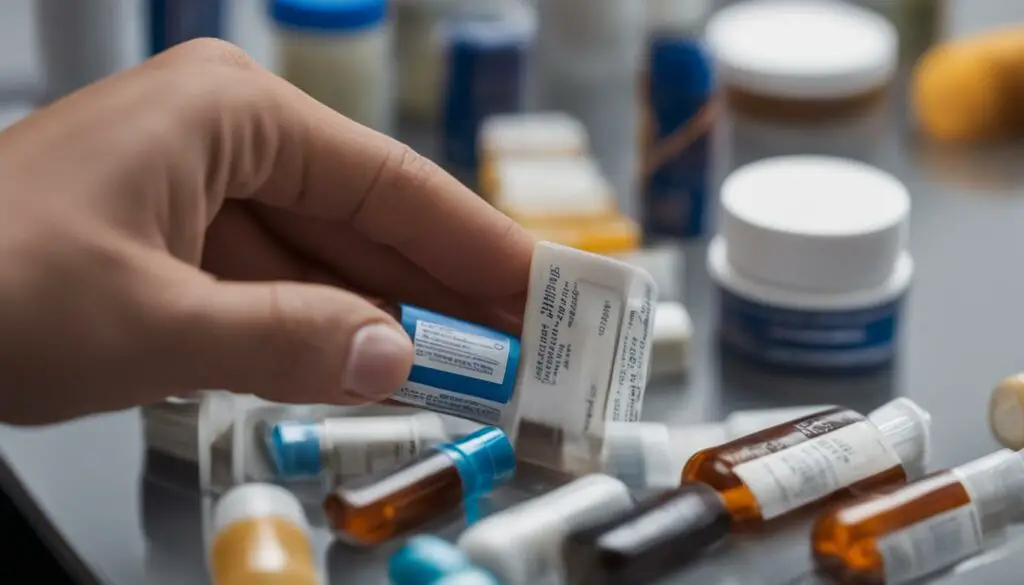
Comparing the Types of Flea and Tick Medication
| Type of Medication | Mode of Action | Targeted Parasites | Application Method |
|---|---|---|---|
| Anticholinesterase insecticides | Inhibits cholinesterase enzymes | Fleas and ticks | Topical or oral |
| Pyrethrins | Attacks nervous system | Fleas and ticks | Topical or spray |
| Amitraz | Disrupts nervous system | Ticks | Tick collars |
| Isoxazoline antiparasitic agents | Blocks specific receptors | Fleas and ticks | Topical or oral |
It is important to note that each type of medication may have varying levels of effectiveness and potential side effects. Pet owners should consult with a veterinarian to determine the most appropriate and safe flea and tick medication for their cats.
Signs of Flea and Tick Medication Poisoning
Flea and tick medication poisoning in cats can have serious effects on their health. It is important to be able to recognize the signs of poisoning, as early intervention is crucial for a positive outcome. The symptoms of flea and tick medication poisoning can vary depending on the specific medication and its mechanism of action.
Common signs of poisoning include:
- Anorexia (loss of appetite)
- Excessive salivation
- Diarrhea
- Tremors
In severe cases, cats may also experience seizures. These symptoms indicate toxicity and require immediate veterinary attention.
It is worth noting that different types of flea and tick medications may cause different symptoms, so it is essential to consult with a veterinarian if you notice any unusual signs in your cat. Prompt recognition of the signs of poisoning can help ensure timely and appropriate treatment.
Causes of Flea and Tick Medication Poisoning
Flea and tick medication poisoning in cats can occur due to various reasons, including accidental application of dog products, exposure to recently treated pets, sensitivity to properly applied products, or overdose. It is crucial for pet owners to be aware of these causes and take the necessary precautions to prevent poisoning incidents.
Accidental application of dog products is a common cause of flea and tick medication poisoning in cats. Pet owners may mistakenly use products intended for dogs on their cats, not realizing that these products can contain ingredients that are toxic to felines. Cats have a different metabolism and are more sensitive to certain substances, making them more susceptible to poisoning.
Exposure to recently treated pets can also lead to medication poisoning. Cats may groom or come into contact with other animals that have been treated with flea and tick medication, resulting in the ingestion or absorption of the toxic substances. Cross-contamination between animals should be avoided to prevent incidents of poisoning.
In some cases, cats may experience sensitivity to properly applied flea and tick products. These reactions can occur even when the products are used correctly according to the manufacturer’s instructions. Cats may exhibit adverse reactions to certain ingredients, leading to poisoning symptoms.
| Causes of Flea and Tick Medication Poisoning | Description |
|---|---|
| Accidental application of dog products | This occurs when pet owners mistakenly use flea and tick products designed for dogs on their cats, exposing them to toxic ingredients. |
| Exposure to recently treated pets | Cats may come into contact with other animals that have been recently treated with flea and tick medication, resulting in the ingestion or absorption of toxic substances. |
| Sensitivity to properly applied products | Cats may have adverse reactions to certain ingredients in flea and tick medication, even when the products are used correctly. |
| Overdose | Administering an excessive amount of flea and tick medication to cats can lead to poisoning as their bodies cannot tolerate high levels of these substances. |
Lastly, overdose of flea and tick medication can also cause poisoning in cats. Accidentally giving cats an excessive amount of medication, either through incorrect dosing or multiple applications within a short period, can overwhelm their bodies and lead to toxic effects.
To prevent flea and tick medication poisoning, it is essential to use the correct products and dosages specifically labeled for cats. Pet owners should consult with a veterinarian for guidance on selecting safe and suitable medication for their feline companions. Taking these precautions can help ensure the well-being and safety of cats when it comes to flea and tick prevention and treatment.
Diagnosis of Flea and Tick Medication Poisoning
Diagnosing flea and tick medication poisoning in cats requires a thorough evaluation of the cat’s history, a physical examination, and various laboratory tests. The veterinary team will gather information about the cat’s exposure to flea and tick medication, including the type of medication used, the dosage, and the frequency of application. It is crucial to provide accurate and detailed information to aid in the diagnosis process.
During the physical examination, the veterinarian will assess the cat’s overall condition and look for specific signs of poisoning, such as tremors, salivation, and gastrointestinal distress. The presence of these symptoms, along with a history of flea and tick medication exposure, can strongly indicate poisoning.
To confirm the diagnosis and assess the severity of the poisoning, the veterinarian may perform blood tests. These tests can detect abnormalities in organ function, such as liver or kidney damage, which may be caused by the toxic effects of the medication. Additionally, a urinalysis may be conducted to evaluate kidney function and detect any potential urinary abnormalities.
The combination of the cat’s history, physical examination findings, and laboratory test results allows veterinarians to make an accurate diagnosis of flea and tick medication poisoning. This information is crucial for determining the appropriate treatment plan and providing the best possible care for the affected cat.
Treatment of Flea and Tick Medication Poisoning
When a cat experiences flea and tick medication poisoning, timely and appropriate treatment is essential for a favorable outcome. The primary goal is to provide supportive care to manage the symptoms and remove the toxic medication from the cat’s system.
Supportive care may include intravenous (IV) muscle relaxers to control tremors, IV fluids to maintain hydration, and anti-nausea medication to alleviate vomiting. In severe cases, intralipid therapy, which involves administering a lipid emulsion, may be used to bind and remove the medication from the body.
It is important to note that treatment should be administered under the guidance of a veterinarian. They will assess the severity of the poisoning and tailor the treatment plan accordingly. In some cases, hospitalization may be necessary to closely monitor the cat’s condition and provide intensive care.
Table:
| Treatment Options | Description |
|---|---|
| Supportive care | Includes IV muscle relaxers, IV fluids, and anti-nausea medication to manage symptoms |
| Removal of medication | Intralipid therapy may be used to bind and eliminate the toxic medication from the cat’s system |
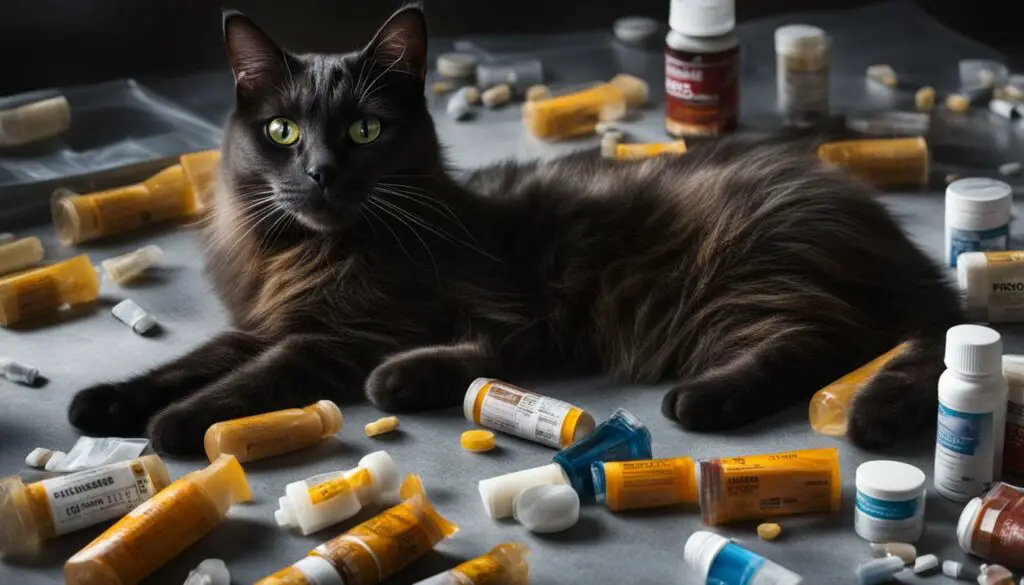
Recovery and Management of Flea and Tick Medication Poisoning
After a cat has experienced flea and tick medication poisoning, proper recovery and management are crucial to ensure their well-being. The prognosis for cats that recover from this poisoning depends on early intervention and aggressive treatment. With the right care and precautions, cats can go on to live normal lives without any lasting consequences.
Management of flea and tick medication poisoning involves implementing preventative measures to avoid future incidents. This includes using appropriate products specifically labeled for cats and following dosing instructions carefully. It is important to keep all medications out of the reach of animals to prevent accidental exposure.
Preventing further poisoning episodes is key to ensuring a cat’s long-term health and safety. Regular veterinary check-ups and consultations are important for monitoring the cat’s recovery progress and addressing any concerns. By staying proactive and vigilant, pet owners can minimize the risk of recurrence and provide their cats with a safe and healthy environment.
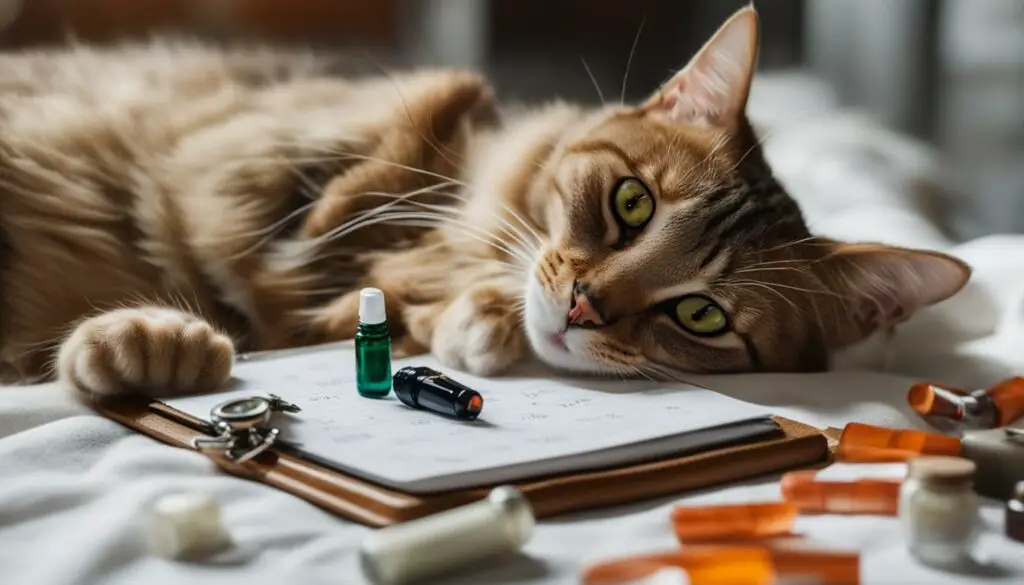
Table: Tips for Recovery and Management of Flea and Tick Medication Poisoning
| Tips | Description |
|---|---|
| Follow veterinary instructions | Strictly adhere to the treatment plan and any recommendations provided by the veterinarian. |
| Monitor for symptoms | Keep a close eye on the cat for any signs of recurring or new symptoms related to flea and tick medication poisoning. |
| Prevent future exposure | Use only cat-safe products and avoid cross-contamination between animals to prevent accidental exposure to toxic substances. |
| Keep medications out of reach | Store all medications securely, ensuring they are inaccessible to curious pets. |
| Regular veterinary check-ups | Schedule follow-up appointments with the veterinarian to monitor the cat’s progress and address any lingering concerns. |
By following these tips and working closely with a veterinarian, pet owners can effectively manage and support their cat’s recovery from flea and tick medication poisoning. With dedicated care and attention, cats can thrive and enjoy a healthy life free from the effects of this type of poisoning.
Importance of Follow-Up Care
After a cat has recovered from flea and tick medication poisoning, it is crucial to schedule a follow-up appointment with the veterinarian to ensure complete recovery and address any lingering concerns. Follow-up care plays a vital role in monitoring the cat’s progress and ensuring that there are no long-term effects from the poisoning. During the appointment, the veterinarian will conduct a thorough examination to assess the cat’s overall health and well-being.
The follow-up appointment provides an opportunity for the veterinarian to discuss any necessary lifestyle changes or precautions that may help prevent future incidents of flea and tick medication poisoning. The veterinarian may recommend switching to alternative flea and tick prevention methods or adjusting the dosage of the current medication to minimize the risk of poisoning. Additionally, the veterinarian can provide guidance on proper storage and handling of flea and tick medication to prevent accidental ingestion or exposure.
Regular veterinary care is essential for the long-term well-being of cats. In addition to addressing any concerns related to flea and tick medication poisoning, the follow-up appointment allows the veterinarian to catch any other potential health issues early on. It is recommended to adhere to the veterinarian’s advice and establish a routine schedule for check-ups and preventative care. By maintaining a proactive approach to your cat’s health, you can help ensure a happy and healthy life for your furry friend.
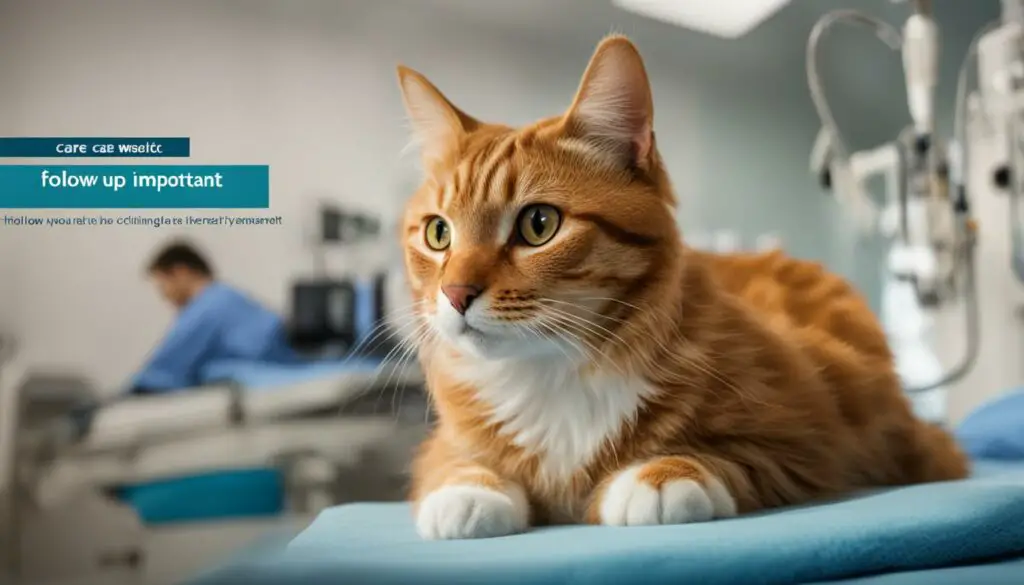
Preventing Flea and Tick Medication Poisoning
If you’re a cat owner, it’s crucial to take steps to prevent flea and tick medication poisoning. By using these medications safely and consulting with a veterinarian, you can ensure the well-being of your feline friend. Here are some important measures to consider:
- Choose Cat-Safe Products: When it comes to flea and tick prevention, always use products specifically formulated for cats. Dog products can be toxic to cats, so it’s essential to avoid using them on your feline companion. Consult with your veterinarian to find the best and safest products for your cat’s needs.
- Follow Proper Use Instructions: Always read and follow the instructions provided with the flea and tick medication. Proper dosage and application are essential to ensure the effectiveness and safety of the product. Using more than the recommended dosage or applying the medication incorrectly can increase the risk of poisoning.
- Consult with a Veterinarian: Before using any flea and tick medication on your cat, it’s important to consult with your veterinarian. They can provide guidance on the safest and most effective options for your pet. Your veterinarian will also consider your cat’s health history and any potential interactions with other medications your cat is taking.
- Monitor for Side Effects: While using flea and tick medication, it’s crucial to closely monitor your cat for any side effects or adverse reactions. Be on the lookout for symptoms such as excessive drooling, vomiting, diarrhea, tremors, or seizures. If you notice any unusual behavior or symptoms, contact your veterinarian immediately.
By following these preventative measures, you can significantly reduce the risk of flea and tick medication poisoning in your cat. Remember, the safety and well-being of your pet should always be a top priority.
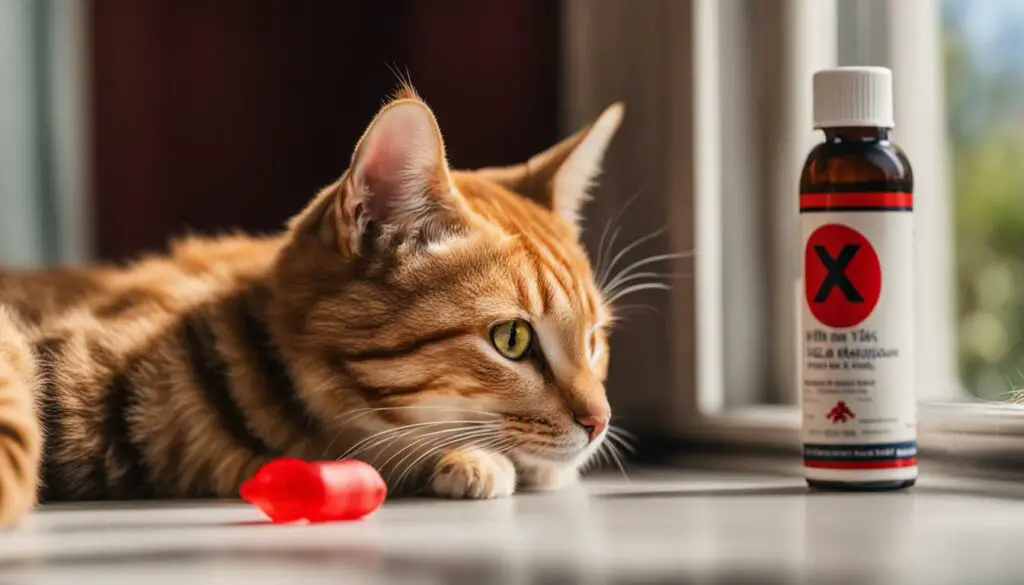
Further precautions to consider:
In addition to the above measures, there are other precautions you can take to protect your cat from flea and tick medication poisoning:
- Store Medications Properly: Keep all medications, including flea and tick products, in a secure location that is inaccessible to your cat. This will prevent accidental ingestion or exposure.
- Regular Veterinary Check-ups: Schedule regular check-ups with your veterinarian to ensure your cat’s overall health and well-being. They can provide guidance on flea and tick prevention and address any concerns you may have.
- Be Cautious with Multi-Pet Environments: If you have multiple pets, make sure to separate cats and dogs during flea and tick treatment. This will prevent cross-contamination and reduce the risk of accidental exposure to toxic substances.
By taking these additional precautions, you can create a safe and healthy environment for your cat. Remember, prevention is key when it comes to protecting your pet from flea and tick medication poisoning.
The Dangers of Using Inappropriate Medications
Using flea and tick medication designed for other animals, such as dogs, on cats can have serious consequences and even lead to death. Cats have a different metabolism and are more susceptible to certain toxicities. It is essential to use the correct medications for your cat’s safety.
When cats are exposed to inappropriate flea and tick medications, they can experience severe adverse reactions due to the differences in their metabolism compared to other animals. These medications may contain ingredients that are safe for dogs but toxic to cats, causing a range of symptoms such as vomiting, diarrhea, excessive salivation, muscle tremors, seizures, and even organ failure.
The consequences of using inappropriate medications on cats can be fatal. It is crucial to always read the labels carefully and ensure that the product is specifically formulated for cats. Consulting with a veterinarian before using any flea and tick medication is highly recommended to ensure its safety and suitability for your feline companion.
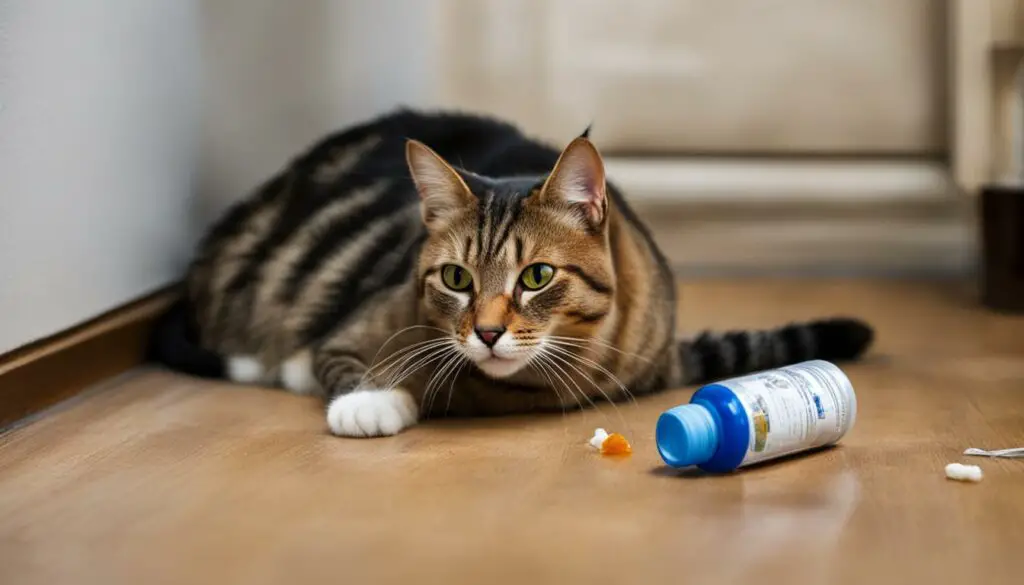
“Using flea and tick medication designed for dogs on cats is extremely dangerous and can result in severe illness or death. Always use products specifically labeled for cats and consult with your veterinarian to ensure the safety of your pet.” – Dr. Jane Smith, Veterinarian
Table: Comparison of Cat and Dog Flea and Tick Medication
| Flea and Tick Medication | Cat(s) | Dog(s) |
|---|---|---|
| Product A | Safe for cats | Safe for dogs |
| Product B | Toxic to cats | Safe for dogs |
| Product C | Safe for cats | Toxic to dogs |
As illustrated in the table, certain flea and tick medications may have different effects on cats and dogs. It is vital to choose the right product for your cat’s well-being and to avoid any potential risks associated with inappropriate medication use.
Cost of Treating Flea and Tick Medication Poisoning
Dealing with flea and tick medication poisoning in cats can be a costly endeavor. The expenses involved in treating this condition can vary depending on the severity of the poisoning and the necessary medical interventions. It’s important for pet owners to be aware of the potential financial implications and consider appropriate measures to manage the costs.
When a cat is suspected to have been poisoned by flea and tick medication, immediate veterinary attention is crucial. The initial examination and diagnostic tests can involve significant costs. These may include blood tests, urinalysis, and other diagnostic procedures to determine the extent of the poisoning and develop an appropriate treatment plan. The expenses associated with these initial assessments can quickly add up.
In more severe cases, hospitalization may be necessary to provide intensive care and support for the poisoned cat. The costs of hospitalization can be substantial, covering the administration of intravenous fluids, medication, and monitoring by trained veterinary professionals. The duration of hospitalization will depend on the cat’s response to treatment and the severity of the poisoning.
| Treatment | Estimated Cost Range |
|---|---|
| Initial veterinary examination and diagnostic tests | $200 – $500 |
| Hospitalization (overnight stay) | $500 – $1,500 |
| Intensive care (per day) | $500 – $1,000 |
| Medications and treatments | $100 – $500 |
Pet insurance can help alleviate the financial burden associated with treating flea and tick medication poisoning. It is advisable for pet owners to explore pet insurance options that cover poisoning incidents, as well as general health issues. By having pet insurance in place, owners can have peace of mind knowing that the costs of treatment will be partially or fully covered, depending on the policy.
Ultimately, it is important for cat owners to prioritize their pet’s well-being and take appropriate measures to prevent flea and tick medication poisoning. By using cat-safe products, following proper dosage instructions, and consulting with a veterinarian, pet owners can help minimize the risk of poisoning and potential financial strain.

Understanding Different Types of Flea and Tick Medications
When it comes to protecting our furry friends from fleas and ticks, there are various medications available on the market. Each type of medication works differently and understanding their mechanisms can help pet owners make informed choices. Let’s take a closer look at the different types of flea and tick medications and how they work.
Anticholinesterase Insecticides
Anticholinesterase insecticides are a common type of flea and tick medication used to kill and repel these pesky parasites. These medications work by inhibiting cholinesterase enzymes, which are essential for the proper functioning of the nervous system in fleas and ticks. By disrupting their nervous system, the medications effectively eliminate these pests. However, it is important to use these medications with caution as they can also pose risks to cats.
Pyrethrins
Derived from Chrysanthemum flowers, pyrethrins are natural compounds that have insecticidal properties. These medications work by targeting the nervous system of fleas and ticks, leading to paralysis and subsequent death. Pyrethrins are generally considered safe for cats when used in appropriate doses. However, it is important to avoid using products containing pyrethrins that are intended for dogs, as they may contain additional ingredients that can be toxic to cats.
Amitraz
Amitraz is an alpha-adrenergic agonist that is sometimes used as a flea and tick medication for dogs. While it is not commonly used for cats, accidental exposure or ingestion of products containing amitraz can occur. It is important to keep such products away from cats as they can be toxic and potentially fatal to them.
Isoxazoline Antiparasitic Agents
Isoxazoline antiparasitic agents have become increasingly popular in recent years due to their efficacy in killing fleas and ticks. These medications work by targeting specific receptors in the nervous system of these parasites. They are available in both topical and oral forms and provide long-lasting protection against fleas and ticks. However, it is important to use these medications according to the instructions and dosage recommended by your veterinarian.

Understanding the different types of flea and tick medications is essential for pet owners to make informed decisions about their cat’s healthcare. It is important to consult with a veterinarian to determine the most suitable medication for your cat and to ensure that it is used safely and correctly. By using the appropriate medication, you can protect your cat from fleas and ticks while also keeping them safe and healthy.
Importance of Using Cat-Safe Products
Flea and tick prevention is essential for the health and wellbeing of our feline companions. However, it’s crucial to use products specifically formulated for cats to ensure their safety. Using dog products on cats can have detrimental effects and even be toxic. To protect your cat from potential harm, consult with a veterinarian to determine the best cat-safe products for flea and tick prevention.
Cross-contamination between animals should be avoided when using flea and tick medication. Cats have different sensitivities and metabolisms than dogs, making them more susceptible to certain toxicities. By using appropriate medications designed for cats, you can significantly reduce the risk of adverse reactions and ensure the effectiveness of the treatment.
“Safe and effective flea and tick prevention is a top priority for cat owners. Always read product labels carefully and follow the recommended dosage instructions. When in doubt, consult your veterinarian for guidance.”
Preventing flea and tick infestations not only protects your cat, but it also promotes a healthier living environment for the entire family. By using cat-safe products and following proper usage guidelines, you can keep your furry friend safe and free from the discomfort and health risks associated with fleas and ticks.

Conclusion
After learning about the devastating consequences of flea and tick medication poisoning in cats, it is clear that taking precautions and ensuring pet safety is of utmost importance. No pet owner wants to experience the loss of their beloved cat due to a preventable incident. By following a few simple guidelines, we can protect our cats from harm.
First and foremost, it is crucial to use only cat-safe products specifically formulated for our furry feline friends. Using dog products or inappropriate medications can have fatal consequences for cats. Always consult with a veterinarian to determine the best flea and tick prevention options for your cat’s safety and well-being.
Additionally, it is essential to follow proper dosing instructions and avoid cross-contamination between animals. Accidental application of dog products or exposure to recently treated pets can put our cats at risk. By using the correct products and dosages, we can prevent flea and tick medication poisoning and ensure the health of our beloved pets.
Remember, pet safety should always be a top priority. By taking these precautions, consulting with a veterinarian, and using appropriate products, we can protect our cats from the tragedy of flea and tick medication poisoning. Let’s keep our furry friends safe and healthy for many joyful years ahead.
FAQ
Why did my cat die after flea treatment?
Flea and tick medication poisoning can have serious consequences for cats, including death. It is important to understand the potential risks and take precautions to ensure the safety of your pet.
What are the different types of flea and tick medication available?
There are various types of flea and tick medication, including anticholinesterase insecticides, pyrethrins, amitraz, and isoxazoline antiparasitic agents. Each type works differently and may pose varying risks to cats.
What are the signs of flea and tick medication poisoning in cats?
Common symptoms include anorexia, salivation, diarrhea, tremors, and seizures. The specific signs may vary depending on the type of medication and mechanism of action. Prompt recognition of these signs is crucial for early intervention.
What can cause flea and tick medication poisoning in cats?
Flea and tick medication poisoning in cats can occur due to accidental application of dog products, contact with recently treated pets, sensitivity to properly applied products, or overdose. It is important to use the correct products and dosages for cats and avoid cross-contamination between animals.
How is flea and tick medication poisoning diagnosed in cats?
Veterinarians diagnose flea and tick medication poisoning in cats based on a detailed history of exposure, physical examination findings, and laboratory tests such as blood tests and urinalysis. An accurate diagnosis is crucial for proper treatment.
How is flea and tick medication poisoning in cats treated?
Treatment focuses on providing supportive care to manage symptoms. This can include IV muscle relaxers, IV fluids, anti-nausea medication, and intralipid therapy. In severe cases, hospitalization may be necessary for monitoring and treatment. Prompt intervention is crucial for a favorable outcome.
Can cats recover from flea and tick medication poisoning?
Cats that recover from flea and tick medication poisoning can go on to live normal lives with no lasting consequences. However, the prognosis depends on early and aggressive treatment. It is important to follow preventative measures to avoid future incidents.
Is follow-up care necessary after a cat recovers from flea and tick medication poisoning?
Yes, it is important to schedule a follow-up appointment with the veterinarian to ensure complete recovery and address any lingering concerns. Regular veterinary care is essential for maintaining the well-being of your pet.
How can I prevent flea and tick medication poisoning in cats?
The best way to prevent flea and tick medication poisoning is by using the medication as directed and only using products specifically labeled for cats. It is important to consult with a veterinarian before using any flea and tick medication to ensure it is safe and appropriate for your cat.
Can using flea and tick medication designed for other animals be dangerous for cats?
Yes, using flea and tick medication designed for other animals, such as dogs, on cats can have serious consequences and even lead to death. Cats have a different metabolism and are more susceptible to certain toxicities. It is essential to use the correct medications for your cat’s safety.
Is pet insurance beneficial for covering the cost of treating flea and tick medication poisoning?
Yes, treating flea and tick medication poisoning in cats can be expensive, especially if hospitalization and intensive care are required. Pet insurance can help cover the costs of treatment and provide financial relief. It is beneficial to consider pet insurance options to ensure the well-being of your pet.
What are the different types of flea and tick medications and how do they work?
Different flea and tick medications work in different ways, such as anticholinesterase insecticides, pyrethrins derived from Chrysanthemum flowers, amitraz as an alpha-adrenergic agonist, and isoxazoline antiparasitic agents. Understanding the mechanisms of these medications can help pet owners make informed choices.
Why is it important to use cat-safe products for flea and tick prevention?
Using products specifically formulated for cats is crucial for their safety. Dog products can be toxic to cats, and cross-contamination between animals should be avoided. Consult with a veterinarian to determine the best cat-safe products for your pet.
Source Links
- https://www.petmd.com/cat/conditions/poisoning/neurological/flea-and-tick-medicine-poisoning-cats
- https://cats.com/flea-and-tick-medication-poisoning-in-cats
- https://wagwalking.com/cat/condition/flea-tick-medicine-poisoning








